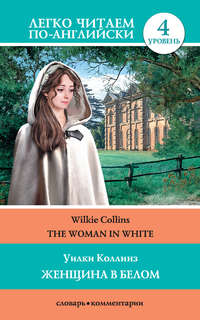Kitobni o'qish: «The Woman in White / Женщина в белом»
Подготовка текста, комментарии и словарь С. А. Матвеева
© ООО «Издательство АСТ», 2015
The First Epoch
The Story Begun by Walter Hartright1 (of Clement’s Inn,2 Teacher of Drawing)
One day I received a letter. Frederick Fairlie, Esquire, of Limmeridge House, Cumberland,3 wanted to hire a competent drawing-master, for a period of four months.
The master was to superintend the instruction of two young ladies in the art of painting in water-colours;4 and he was to devote his leisure time, afterwards, to the business of repairing and mounting a valuable collection of drawings. Four guineas a week was the salary!
“Oh, Walter, your father never had such a chance as this!5” said my mother, when she had read the letter and had handed it back to me.
This teacher would live at Limmeridge House with the family. I knew I was very lucky to get this job. Teaching the young ladies would be easy and pleasant, and the pay and working conditions were excellent.
The next morning I sent my papers. Three days passed, and on the fourth day, an answer came. It announced that Mr. Fairlie accepted my services, and requested me to start for Cumberland immediately. All the necessary instructions for my journey were carefully and clearly added in a postscript.
The heat had been awful all day, and it was now a close and sultry night. The moon was full and broad in the dark blue starless sky. I decided to walk. I wound my way down slowly over the heath. By the time I had arrived at the end of the road I had become completely absorbed in my own fanciful visions of Limmeridge House, of Mr. Fairlie, and of the two ladies whose practice in the art of water-colour painting I was so soon to superintend.6
I had now arrived at the point where four roads met – the road to Hampstead,7 along which I had returned, the road to Finchley,8 the road to West End, and the road back to London. I had mechanically turned in this latter direction. Suddenly I felt the touch of a hand laid lightly and suddenly on my shoulder from behind me.
There, in the middle of the broad bright wide road stood the figure of a solitary Woman, dressed from head to foot in white garments. The strange woman spoke first.
“Is that the road to London?” she said.
I looked attentively at her. It was then nearly one o’clock. There was nothing wild, nothing immodest in her manner: it was quiet and self – controlled. The voice had something curiously still and mechanical in its tones, and the utterance was remarkably rapid. She held a small bag in her hand: and her dress – bonnet, shawl, and gown all of white – was certainly not composed of very delicate or very expensive materials. I guessed her to be about twenty-two years old.
“Did you hear me?” she said, still quietly and rapidly. “I asked if that was the way to London.”
“Yes,” I replied, “that is the way: it leads to St. John’s Wood9 and the Regent’s Park.10 You must excuse me; I didn’t see you until you touched me. You gave me quite a shock.”
“I did not do anything wrong, I have met with an accident11 – I am very unfortunate.”
She spoke with unnecessary earnestness and agitation. She turned, and pointed back to a place at the junction of the road to London and the road to Hampstead, where there was a gap in the hedge.
“I was hiding among those trees,” she said. “I heard you coming. I was afraid to speak to you until I had seen your face. When I saw that your face was kind, I followed you and touched you. Will you help me?”
Touch me? Why not call to me? Strange, very strange.
“May I trust you?” she asked. “I have met with an accident.” She stopped in confusion; and sighed bitterly.
The helplessness of the woman touched me.
“Please,” I said. “If it troubles you to explain your strange situation to me, don’t do it. I have no right to ask you for any explanations. Tell me how I can help you; and if I can, I will.”
“You are very kind, and I am very, very thankful to have met you. I have only been in London once before,” she went on, more and more rapidly, “and I don’t know London very well. But I have a friend here, a lady, who will be very glad to see me. I can stay with her but I need to carriage to take me to her house. Can you help me find one? Will you promise?”
She looked anxiously up and down the road; shifted her bag again from one hand to the other; repeated the words, “Will you promise?” and looked hard in my face.
What could I do? No house was near; no one was passing whom I could consult.
“Are you sure that your friend in London will receive you at such a late hour as this?” I said.
“Quite sure. But you must leave me when I tell you. Will you promise?”
As she repeated the words for the third time, she came close to me and laid her hand on my bosom – a thin hand; a cold hand (when I removed it with mine) even on that sultry night. Remember that I was young; remember that the hand which touched me was a woman’s.
“Will you promise?”
“Yes.”
We set our faces towards London, and walked on together in the first still hour of the new day – I, and this woman, whose name, whose character, whose story, whose objects in life, whose very presence by my side, at that moment, were mysteries to me. It was like a dream. Was I Walter Hartright? Who was this mysterious woman?
“I want to ask you something,” she said suddenly. “Do you know many people in London?”
“Yes, a great many.”
“And do you know anybody in London with the title of Baronet?12”
As she asked me this, she was staring hard into my face. I was astonished by her question.
“Why do you ask?”
“Because I hope, there is one Baronet that you don’t know.”
“Will you tell me his name?”
“I can’t – I daren’t – I forget myself when I mention it.” She spoke loudly. “I hope you don’t know him!”
“No,” I said, “I don’t know any baronets. I’m only a drawing-master. I am afraid the baronet, whose name you are unwilling to mention to me, has done you something wrong. Who is this wicked baronet?”
“Thank God!” she said to herself. “I may trust him. I can’t tell you any more.”
The woman was looking very upset.
“Please don’t ask me any more questions.”
We walked forward again at a quick pace;13 and for half an hour, at least, not a word passed on either side. We had reached the first houses.
“Do you live in London?” she said.
“Yes,” I answered. And I added, “But tomorrow I shall be away from London for some time. I am going into the country.”
“Where?” she asked. “North or south?”
“North – to Cumberland.”
“Cumberland!” she repeated the word tenderly. “How I wish I was going there too. I was once happy in Cumberland.”
I tried again to lift the veil that hung between this woman and me.
“Perhaps you were born,” I said, “in the beautiful Lake country.”
“No,” she answered. “I was born in Hampshire; but I once went to school for a little while in Cumberland. Lakes? I don’t remember any lakes. Mrs Fairlie was my good friend. Mrs Fairlie’s husband was very rich and they lived in a big house, called Limmeridge House, just outside the village.”
It was my turn now to stop suddenly, staggered with astonishment.
“Ah! Mrs. Fairlie is dead; and her husband is dead; and their little girl may be married and gone away by this time. I can’t say who lives at Limmeridge now. If any more are left there of that name, I only know I love them.”
“This is London,” she said. “Do you see any carriage I can get? I am tired and frightened. I want to shut myself in and be driven away.”
I saw a cab, on the opposite side of the way.
“It’s so late,” she said. “I am only in a hurry because it’s so late. And I’m so tired, I don’t think I can walk any further. Let me take that cab.”
I saw that the driver had a kind face and I was sure he wouldn’t harm her. She got into the cab but I didn’t hear the address she gave to the driver.
“I’m quite safe, and quite happy now,” she said vehemently. “If you are a gentleman, remember your promise. Thank you – oh! thank you, thank you!”
My hand was on the cab door. She caught it in hers, kissed it, and pushed it away. The cab set off slowly, and disappeared into the darkness. The woman in white was gone.
Ten minutes or more had passed. I was still on the same side of the way. I was on the dark side of the road, in the thick shadow of some garden trees, when I stopped to look round. Suddenly I saw two men.
“Stop!” cried one. “Let’s ask him. Have you seen a woman pass this way, sir?”
“What sort of woman, sir?”
“A woman in white!”
“If you meet with the woman, please, stop her.”
“Why? What has she done?”
“She has escaped from the Asylum. Don’t forget; a woman in white!”
And two men ran away.
“She has escaped from my Asylum!” In the disturbed state of my mind, it was useless to think of going to bed, when I at last got back to my chambers. I sat down and tried to draw, then to read – but the woman in white got between me and my pencil, between me and my book. Where had she stopped the cab? What had become of her now?14
* * *
The following day I travelled to Cumberland. The journey was long, we drove away slowly through the darkness in perfect silence. The roads were bad, we could not go fast. We had passed one gate before entering the drive, and we passed another before we drew up at the house. Except for one servant, everybody had gone to bed. I was informed that the family had retired for the night, and was then led into a large room where my supper was awaiting me.
I was too tired to eat or drink much. In a quarter of an hour I was ready to go to bed. The servant said, “Breakfast at nine o’clock, sir” – looked all round him to see that everything was in its proper place, and noiselessly went away.
“What shall I see in my dreams tonight?” I thought to myself, as I put out the candle; “The woman in white? Or the unknown inhabitants of this Cumberland mansion?”
When I got up the next morning, the sun was shining. From my window I had a wonderful view of the gardens stretching down to the bright blue sea in the distance. It was all so different from my tiny room in London that I began to feel enthusiastic and happy about starting my new life.
A little before nine o’clock, I descended to the ground-floor of the house. The servant showed me the way to the breakfast-room.
When I opened the door, I saw a young lady standing by the far window, with her back turned towards me, looking out across the garden. She turned and came towards me, holding out her hand and smiling warmly.
She had thick black hair and dark shining eyes. She wasn’t at all beautiful but the expression on her face was bright, friendly and intelligent.
The lady’s complexion was almost swarthy, and the dark down on her upper lip was almost a moustache. She had a large, firm, masculine mouth and jaw; prominent, piercing, resolute brown eyes; and thick, coal-black hair, growing unusually low down on her forehead.
“Mr. Hartright?” said the lady, her dark face lighting up with a smile, and softening and growing womanly the moment she began to speak. “Allow me to introduce myself as one of your pupils. My name is Marian Halcombe.15 Shall we shake hands? I suppose we must come to it sooner or later – and why not sooner?”
These odd words of welcome were spoken in a clear, ringing, pleasant voice. We sat down together at the breakfast-table in as cordial and customary a manner as if we had known each other for years.
“My sister is in her own room,” continued the lady. “My uncle, Mr. Fairlie, never joins us at any of our meals: he is an invalid, and stays in his own apartments. There is nobody else in the house. Mr. Hartright – which will you have, tea or coffee?”
She handed me my cup of tea, laughing gaily. It was impossible to be formal and reserved in her company.
“My mother was twice married: the first time to Mr. Halcombe, my father; the second time to Mr. Fairlie, my half-sister’s father.16 Except that we are both orphans, we are in every respect as unlike each other as possible. My father was a poor man, and Miss Fairlie’s father was a rich man. I have got nothing, and she has a fortune. I am dark and ugly, and she is fair and pretty. Everybody thinks me crabbed and odd; and everybody thinks her sweet-tempered and charming. In short, she is an angel; and I am – Try some of that marmalade, Mr. Hartright, and finish the sentence, for yourself. What am I to tell you about Mr. Fairlie? Upon my honour, I hardly know. He will send for you after breakfast, and you can study him for yourself. In the meantime, I may inform you, first, that he is the late Mr. Fairlie’s younger brother; secondly,17 that he is a single man; and thirdly,18 that he is Miss Fairlie’s guardian.19 I won’t live without her, and she can’t live without me; and that is how I come to be at Limmeridge House. My sister and I love each other very much. You must please both of us, Mr. Hartright, or please neither of us. Mr. Fairlie is too great an invalid to be a companion for anybody. I don’t know what is the matter with him, and the doctors don’t know what is the matter with him, and he doesn’t know himself what is the matter with him. We all say it’s on the nerves, and we none of us know what we mean when we say it. However, I advise you to humour his little peculiarities, when you see him today. Admire his collection of coins, prints, and water-colour drawings, and you will win his heart. From breakfast to lunch, Mr. Fairlie’s drawings will occupy you. After lunch, Miss Fairlie and I will go out to draw, under your directions. Drawing is her favourite whim, not mine. Women can’t draw – their minds are too flighty, and their eyes are too inattentive. No matter – my sister likes it; so I waste paint and spoil paper. As for the evenings, I think we can find interesting things to do. Miss Fairlie plays delightfully. And I can play chess, cards, and even billiards as well. What do you think of the plan? I do hope you’ll be happy with us. We enjoy living here, but it’s very quiet. We don’t have any of the excitement or adventures which you must be used to in London.”
Immediately her words reminded me of the woman in white.
“I don’t need any more adventures,” I said. “Two nights ago, I had an adventure which I will never forget.”
“You don’t say so,20 Mr. Hartright! May I hear it?”
“You have a claim to hear it. The chief person in the adventure was a total stranger to me, and may perhaps be a total stranger to you; but she certainly mentioned the name of Mrs. Fairlie.”
“Mentioned my mother’s name! You interest me. Pray go on.”
Then I told Miss Halcombe about my meeting with the mysterious woman in white, exactly as they had occurred; and I repeated what she had said to me about Mrs. Fairlie and Limmeridge House, word for word.
“The strange thing is that she mentioned your mother, Mrs Fairlie,” I said. “She seemed to have known her and loved her very much. Do you know who this woman can possibly be?”
Miss Halcombe’s face expressed vivid interest and astonishment, but nothing more. She shook her head. She looked interested but also astonished. Clearly she had no idea who the woman in white could be.
“Whoever she may be,” I continued, “the woman knew that Mrs. Fairlie and her husband were both dead; and she spoke of Miss Fairlie as if they had known each other when they were children. She told me she came from Hampshire.”
“You had better not speak of it yet to Mr. Fairlie, or to my sister. They are rather nervous and sensitive. When my mother came here, after her second marriage, she certainly established the village school just as it exists at the present time. But the old teachers are all dead, or gone elsewhere. The only other alternative I can think of – ”
At this point we were interrupted by the entrance of the servant, with a message from Mr. Fairlie, telling that he would be glad to see me, as soon as I had done breakfast.
“Wait in the hall,” said Miss Halcombe, answering the servant for me, in her quick, ready way. “Mr. Hartright will come out directly. I was about to say,” she went on, addressing me again, “that my sister and I have a large collection of my mother’s letters, addressed to my father and to hers. In the absence of any other means of getting information, I will pass the morning in looking over my mother’s correspondence with Mr. Fairlie. I hope to discover something when we meet again. The luncheon hour is two, Mr. Hartright. I shall have the pleasure of introducing you to my sister by that time, and we will occupy the afternoon in driving round the neighbourhood and showing you all our pet points of view. Till two o’clock, then, farewell.”
As soon as she had left me, I turned my steps towards the hall, and followed the servant, on my way, for the first time, to the presence of Mr. Fairlie.
We arranged to meet later and I went upstairs to Mr Fairlie’s room. The furniture was the perfection of luxury and beauty; the table in the centre was full of books, elegant conveniences for writing, and beautiful flowers; the second table, near the window, was covered with all the necessary materials for mounting water-colour drawings. It was the prettiest and most luxurious little sitting-room I had ever seen; and I admired it with the warmest enthusiasm.
The servant silently opened the door for me to go out into the passage. We turned a corner, and entered a long second passage. The servant disclosed two curtains of pale sea-green silk hanging before us; raised one of them noiselessly; softly uttered the words, “Mr. Hartright,” and left me.
I found myself in a large, lofty room, with a magnificent carved ceiling, and with a carpet over the floor, so thick and soft that it felt like piles of velvet under my feet. One side of the room was occupied by a long bookcase of some rare wood that was quite new to me. Mr. Fairlie was over fifty and under sixty years old. His beardless face was thin, worn, and pale, but not wrinkled; his nose was high and hooked; his eyes were large; his hair was scanty. He was dressed in a dark frock-coat.21 Two rings adorned his white delicate hands.
“I am very glad to see you at Limmeridge, Mr. Hartright,” he said in a croaking voice. “Pray sit down. And don’t trouble yourself to move the chair, please. Movement of any kind is painful to me. My nerves are very delicate, you know. Have you got everything you want? Do you like your room?
“Everything is fine,” I started to say, but to my surprise Mr. Fairlie stopped me.
“Pray excuse me. But could you speak in a lower voice? Loud sound of any kind is torture to me. You will pardon an invalid? Yes. My nerves are very delicate. Have you met Marian and Laura?”
Bepul matn qismi tugad.








